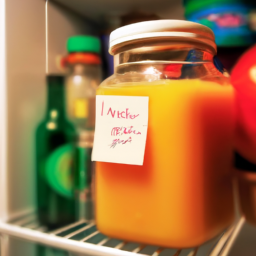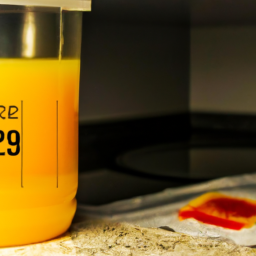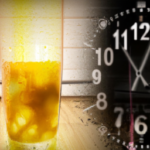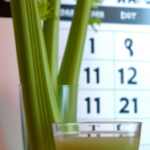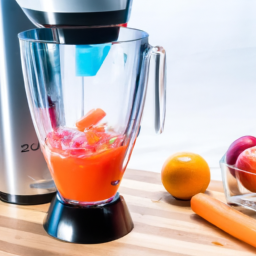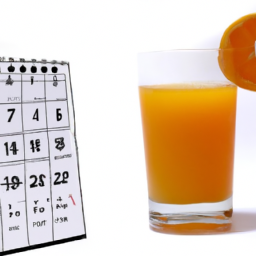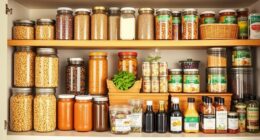In the realm of juicing, our goal is to enjoy the advantages of consuming fresh, nutrient-rich juice. However, what do we do when we prepare too much and are unable to drink it all at once? This is when the importance of correct storage is highlighted.
In this article, I’ll be discussing the importance of storing fresh juice correctly, how long it can last in the fridge, and tips for extending its shelf life.
Firstly, it’s crucial to understand that fresh juice is a perishable item that must be stored correctly to maintain its quality and safety. Improper storage can lead to spoilage, which can be harmful to your health.
That’s why it’s essential to know how long your fresh juice can last in the fridge and how to store it correctly to ensure it stays fresh and safe to drink. So, let’s dive into the specifics of fresh juice storage and how to keep your juice fresh for as long as possible.
Key Takeaways
- Fresh juice should be stored in airtight containers in the coldest part of the fridge to prevent spoilage.
- The recommended temperature range for storing fresh juice is between 32°F and 41°F to avoid exposure to factors that can affect its shelf life.
- Adding citrus or honey to fresh juice can increase acidity and natural antimicrobial properties to preserve it for a longer period of time.
- Store-bought juice often contains added sugars and preservatives that can be harmful to health, while homemade juice can be made with fresh and natural ingredients, making it a healthier option.
The Importance of Proper Juice Storage
Proper juice storage is crucial to ensure it stays fresh and tasty in the fridge! If you don’t store your juice properly, it can quickly spoil, losing its nutritional value and becoming a potential health hazard.
That’s why understanding key tips for proper juice storage and preventing spoilage are essential steps to take. One of the key tips for proper juice storage is to keep it in an airtight container. This helps prevent exposure to oxygen, which can cause the juice to spoil quickly. Additionally, it’s important to store the juice in the coldest part of the fridge, such as the back of the bottom shelf.
This ensures that the juice stays at a consistent temperature and doesn’t experience any fluctuations that could lead to spoilage. By following these simple steps, you can help ensure that your juice stays fresh and delicious for as long as possible.
Understanding the shelf life of fresh juice is crucial for anyone who wants to enjoy it for an extended period of time.
Understanding the Shelf Life of Fresh Juice
You can maximize the deliciousness of your homemade juice by understanding how to extend its lifespan. There are a few ways to prolong the shelf life of fresh juice.
One way is to use a slow juicer instead of a centrifugal juicer. Slow juicers use a masticating process that generates less heat, resulting in juice that lasts longer. Additionally, using airtight containers or vacuum sealing your juice can also help keep it fresh for a longer period of time.
Testing freshness is also a crucial aspect of understanding the shelf life of fresh juice. A simple way to test the freshness of your juice is to smell it. If it smells sour or has a funky odor, it’s likely past its prime. Another way to test freshness is to look at the color. If the juice has started to oxidize, it’ll become darker in color.
By understanding how to prolong the shelf life of fresh juice and testing its freshness, you can enjoy your homemade juices for longer periods of time. Now, let’s move on to how to store fresh juice in the fridge.
How to Store Fresh Juice in the Fridge
When it comes to storing fresh juice in the fridge, there are a few things I always keep in mind.
Firstly, it’s important to choose the right container – one that is airtight and won’t allow any air in.
Secondly, temperature considerations are key – keeping the juice at a consistent, cool temperature will help extend its shelf life.
Lastly, I make sure to avoid contamination by washing my hands, utensils, and the container thoroughly before storing the juice.
These simple steps help me ensure my fresh juice stays fresh and delicious for as long as possible.
Choosing the Right Container
To ensure your fresh juice lasts as long as possible, it’s important to choose the right container.
When it comes to choosing between glass and plastic containers, glass is the better option. Glass containers are non-reactive and won’t absorb any odors or flavors from the juice. On the other hand, plastic containers can be porous and may allow air and bacteria to seep through, affecting the quality and freshness of the juice. Additionally, glass containers are easier to clean and can be reused multiple times, making them a more eco-friendly option.
Another important factor to consider when choosing a container is the level of air-tightness. It’s important to choose a container that is completely air-tight, as exposure to air can cause the juice to oxidize and spoil quicker. Look for containers with a tight-fitting lid or airtight seal, such as mason jars or vacuum-sealed containers.
It’s also important to note that while breathable containers, such as paper cartons or mesh bags, may be environmentally friendly, they are not ideal for storing fresh juice as they allow air to circulate and can cause the juice to spoil quickly.
When it comes to storing fresh juice, choosing the right container is just the first step. Temperature considerations are also important in ensuring the longevity of your juice.
Temperature Considerations
As you think about the temperature of your juice, imagine a delicate flower that needs just the right environment to thrive. Optimal temperatures are crucial in determining how long your fresh juice will last in the fridge.
The recommended temperature range for storing fresh juice is between 32°F and 41°F. If the temperature is too high, the juice may spoil faster due to bacteria growth. On the other hand, if it’s too cold, the juice may freeze, which can affect its quality and taste.
Spoilage factors such as oxygen, light, and heat can also affect the shelf life of your juice. Oxygen exposure can cause the juice to oxidize, leading to a sour taste. Light can also cause the juice to break down and lose its nutrients.
To prevent these factors from affecting your fresh juice, store it in an airtight container that blocks out light and put it in the coldest part of your fridge. By doing so, you can extend the life of your fresh juice and keep it at its best quality.
With optimal temperature and storage, you can now move on to the next section about avoiding contamination.
Avoiding Contamination
Avoiding contamination is a crucial step in preventing spoilage and keeping your fresh juice safe to drink. To maintain good hygiene practices, it’s important to wash your hands before handling any fruits or vegetables. Additionally, make sure to clean all surfaces and equipment, such as cutting boards and juicers, thoroughly with hot, soapy water.
Here are four other ways to prevent contamination and extend the shelf life of your fresh juice:
- Store your juice in airtight containers to reduce exposure to air and bacteria.
- Keep your fridge clean and at a consistent temperature of 40°F or below to slow bacterial growth.
- Use pasteurized juice or heat-treated fruits and vegetables to kill harmful bacteria.
- Avoid using fruits or vegetables that are bruised, moldy, or past their prime, as they may contain harmful bacteria.
By following these hygiene practices and tips for extending the shelf life of fresh juice, you can enjoy your juice for longer and reduce the risk of contamination.
Now, let’s move on to some additional tips for keeping your juice fresh.
Tips for Extending the Shelf Life of Fresh Juice
I’d like to share some tips on how to extend the shelf life of fresh juice.
Adding citrus or honey can help to preserve the juice by increasing its acidity and adding natural antimicrobial properties.
Freezing techniques can also be used to prolong the life of fresh juice, either by freezing the juice itself or by freezing the fruits and vegetables before juicing.
Finally, using preservatives such as ascorbic acid or citric acid can help to keep the juice fresh for a longer period of time.
Adding Citrus or Honey
Sprucing up your juice with a touch of citrus or honey can give it a delightful flavor boost and extend its shelf life in the fridge. Adding sweeteners like honey can help slow down the oxidation process, which is the primary culprit for the spoilage of fresh juices. Meanwhile, citrus fruits like lemons and limes are known for their high acidity, which can also help preserve the juice’s freshness for a longer time.
To illustrate the effectiveness of adding citrus or honey, refer to the table below. The table shows the approximate shelf life of fresh juice with and without the addition of sweeteners or citrus. As you can see, the shelf life of the juice can be extended by several days with just a simple addition of either citrus or honey.
Now that we know how to extend the shelf life of fresh juice, let’s take it a step further and discuss freezing techniques.
Freezing Techniques
To freeze your juice for later use, you’ll want to start by pouring it into ice cube trays. This method of freezing is known as flash freezing and it helps to preserve the nutrients and flavor of the juice.
Here are some juicing hacks to ensure that your frozen juice stays fresh and delicious:
-
Use airtight containers: Once the juice has frozen into cubes, transfer them into airtight containers or freezer bags. This will prevent freezer burn and keep the juice fresh for longer.
-
Label and date: To keep track of your frozen juice, label each container with the type of juice and the date it was frozen. This will help you identify which juice to use first and ensure that you don’t accidentally use expired juice.
-
Use within 3 months: Frozen juice can be stored in the freezer for up to 3 months. After that, the flavor and nutrients may start to deteriorate. It’s best to use your frozen juice within this time frame to ensure that it’s still fresh and flavorful.
Now that you know how to freeze your juice, the next step is to learn about using preservatives to extend the shelf life of your fresh juice.
Using Preservatives
You can use preservatives to extend the life of your juice, but it’s important to note that some individuals avoid them due to concerns about their potential health effects.
However, there are natural preservatives that can be used to keep fresh juice from spoiling. Citric acid, ascorbic acid, and vinegar are all examples of natural preservatives that can be added to juice to help it last longer.
The benefits of preservative-free juice are clear, as it eliminates the potential risks associated with consuming synthetic preservatives. However, if you choose to use a natural preservative, be sure to use the correct amount to avoid altering the taste of the juice.
In the next section, we’ll discuss best practices for juicing that will help ensure your juice is both safe and delicious.
Best Practices for Juicing
When it comes to juicing, I always make sure to choose the freshest ingredients possible. Proper cleaning and sanitizing of all equipment is also crucial to prevent contamination.
Balancing flavors is another key aspect to consider, as it ensures that the final product is both delicious and nutritious.
Choosing Fresh Ingredients
Using fresh and high-quality ingredients is key to ensuring that your juice stays fresh and delicious in the fridge for as long as possible.
When selecting produce for juicing, it’s important to choose ripe fruits and vegetables at their peak freshness. Ripe produce not only tastes better, but it also contains more nutrients than unripe produce.
Additionally, it’s important to avoid using fruits and vegetables that have been treated with pesticides. Pesticides can be harmful to your health and compromise the quality and freshness of your juice.
To ensure that your juice stays fresh in the fridge, it’s important to properly clean and sanitize your juicer before and after each use. This helps prevent the growth of bacteria or mold that can cause your juice to spoil faster.
Proper cleaning and sanitizing also helps remove any residual flavors from previous juices that may affect the taste of your current juice.
By following these simple steps, you can enjoy fresh and delicious juice for days to come.
Proper Cleaning and Sanitizing
Hey there, if you want to make sure that your fresh juice stays fresh for as long as possible in the fridge, proper cleaning and sanitizing of your juicer is crucial.
Cleaning techniques may vary depending on the type of juicer you have, but generally, you should disassemble your juicer and rinse all parts under warm running water immediately after each use. Be sure to remove any pulp or fiber that may have accumulated in the juicing mechanism, as this can harbor bacteria and cause your juice to spoil more quickly.
After cleaning, it’s important to sanitize your juicer to kill any remaining bacteria. You can use a solution of one part white vinegar to four parts water to sanitize your juicer, or you can use a food-grade sanitizer that is specifically designed for use on kitchen appliances.
Once your juicer is cleaned and sanitized, you can confidently store your fresh juice in the fridge for up to 72 hours.
With your juicer properly cleaned and sanitized, you can now move on to the next step of balancing flavors in your fresh juice.
Note: The following section will discuss how to balance flavors in your fresh juice.
Balancing Flavors
To create a delicious and well-balanced fresh juice, you’ll need to pay attention to the flavors and adjust accordingly. Flavor pairing is crucial in achieving a harmonious taste in your juice. Certain fruits and vegetables complement each other well, while others clash and create an unpleasant taste.
For example, apples and carrots go well together, while adding kale to the mix can make the juice taste bitter. Experiment with different flavor combinations and find what works best for you.
Taste testing is another important step in balancing flavors. Before bottling your juice, take a small sample and give it a taste. If it’s too sweet, add some lemon juice to cut the sweetness. If it’s too sour, a little bit of honey can help balance it out. Keep tasting and adjusting until you achieve the perfect balance of flavors.
Moving on to the next section about common mistakes to avoid, it’s important to note that rushing through the flavor balancing process can lead to an unappetizing juice. Taking the time to experiment with different flavor combinations and taste testing can make a significant difference in the end result.
Common Mistakes to Avoid
If you want to ensure your fresh juice lasts as long as possible, you should avoid some common juicing mistakes that can impact its longevity. One of the most common mistakes is not properly cleaning your fruits and vegetables before juicing them. Residual dirt, pesticides, and bacteria can all contribute to the deterioration of your juice and shorten its shelf life. So, make sure to wash your produce thoroughly before processing them.
Another mistake to avoid is not storing your juice properly. Ideally, you should drink your juice right away, but if you need to store it, make sure to do so in an airtight container in the fridge. Exposure to air can cause oxidation and spoilage, so minimizing air exposure is key to maximizing freshness. Additionally, try to consume your juice within 24-48 hours to ensure maximum freshness and nutritional value.
By avoiding these common mistakes, you can help extend the shelf life of your fresh juice. Now, let’s explore some delicious and healthy juice recipes that you can try at home.
Recipes for Delicious and Healthy Juice
Now, let’s dive into some yummy and nutritious juice recipes that will leave you feeling energized and satisfied. When it comes to making fresh juice, choosing the right combination of fruits and vegetables is essential.
One of my favorite juice pairings is a mix of carrots, apples, and ginger. This combination not only tastes delicious but also provides a wealth of health benefits. Carrots are rich in vitamin A, which helps to improve eyesight, while apples are high in antioxidants that help to reduce inflammation. Ginger, on the other hand, aids in digestion and can help to alleviate nausea.
Another great juicing hack is to add leafy greens like spinach or kale to your juice. While these greens may not be the most flavorful, they offer a host of health benefits, including improved heart health and increased energy levels. To make your green juice taste better, try pairing it with a sweet fruit like pineapple or mango. The sweetness of the fruit will help to balance out the bitterness of the greens and create a delicious and nutritious juice.
Now that we’ve explored some delicious and healthy juice recipes, let’s move on to the next section about juicing for health and wellness.
Juicing for Health and Wellness
Improve your overall health and well-being by incorporating fresh juices into your daily routine. The benefits of juicing are undeniable – it can boost your immune system, aid in digestion, and provide your body with essential vitamins and nutrients.
Additionally, juicing for weight loss has become a popular trend. It can help reduce calorie intake while still providing your body with the necessary nutrients.
When juicing for health and wellness, it’s important to choose a variety of fruits and vegetables to ensure you’re getting a wide range of nutrients. Some popular options include leafy greens, citrus fruits, and root vegetables. Be sure to also pay attention to the sugar content in your juices, as some fruits can be high in natural sugars.
Overall, incorporating fresh juices into your diet can be an easy and delicious way to improve your health and well-being.
Transitioning into the subsequent section about comparing store-bought and homemade juice, it’s important to note that while store-bought juices may be convenient, they often contain added sugars and preservatives. By making your own juice at home, you have control over the ingredients and can ensure that your juice is fresh and free from any harmful additives.
Comparing Store-Bought and Homemade Juice
When you compare store-bought and homemade juice, you’ll notice that the store-bought options often contain added sugars and preservatives that can be harmful to your health. For example, a study found that a popular brand of apple juice contained high fructose corn syrup, which has been linked to obesity and other health issues. On the other hand, homemade juice can be made with fresh and natural ingredients, making it a healthier option.
Let’s take a look at the pros and cons of store-bought and homemade juice in the table below.
| Store-bought Juice | Homemade Juice |
|---|---|
| Contains added sugars and preservatives | Made with fresh and natural ingredients |
| Convenient and readily available | Requires time and effort to prepare |
| Longer shelf life | Shorter shelf life |
| May not be as nutritious | Rich in vitamins and minerals |
When it comes to nutritional benefits, homemade juice wins over store-bought juice. By making your own juice, you have control over the ingredients and can ensure that it is packed with nutrients. However, homemade juice does have a shorter shelf life compared to store-bought juice, which can last for weeks due to the added preservatives. It’s important to consume homemade juice within a few days to ensure that it stays fresh and retains its nutritional value.
Frequently Asked Questions
What are the benefits of drinking fresh juice?
Drinking fresh juice offers numerous benefits, including improved nutrient absorption, increased energy levels, and a boost to the immune system. Some people even use juice cleanses to detoxify their bodies and improve overall health.
Can I freeze fresh juice for later use?
Did you know that freezing fresh juice can extend its shelf life by up to six months? However, keep in mind that the quality may degrade over time. Consider using an airtight container and consuming within a few months for the best taste.
How do I know when fresh juice has gone bad?
To determine if fresh juice has expired, check for changes in color, texture, and smell. Common causes of juice spoilage include exposure to air, temperature fluctuations, and bacterial growth.
What is the best type of container to use for storing fresh juice in the fridge?
I prefer using Mason jars over plastic containers to store fresh juice in the fridge because they are reusable, easy to clean, and don’t leach harmful chemicals. Properly cleaning juice containers with hot, soapy water is important to prevent bacterial growth.
Can I mix different types of fruits and vegetables when making fresh juice?
I can mix different types of fruits and vegetables when making fresh juice. Juice combinations can increase the nutritional value of the juice. It is important to choose complementary flavors and balance the sugar content.
Conclusion
In conclusion, proper storage is crucial in maintaining the freshness and quality of your juice. Understanding the shelf life of fresh juice and implementing the right storage techniques can help you enjoy your juice for longer.
However, it’s important to note that even with the best storage practices, fresh juice will eventually deteriorate. This is where the comparison between store-bought and homemade juice comes in. While store-bought juice may have a longer shelf life due to preservatives and pasteurization, homemade juice provides more nutritional value and flavor.
Ultimately, it’s up to you to decide which option works best for your lifestyle and needs. Regardless of your choice, remember to always prioritize proper storage to ensure the best quality and taste of your juice.
Ilana has been a vegan for over 10 years. She originally made the switch for health reasons, but soon found herself becoming more and more passionate about the ethical and environmental implications of a vegan lifestyle. Ilana is the author of The Graceful Kitchen, a blog all about veganism. She loves to cook up delicious and nutritious vegan meals, and share her recipes with others who are interested in leading a cruelty-free life. Ilana is also a strong advocate for using whole foods as the foundation of a healthy diet, and believes that going vegan is one of the best ways to achieve this.
